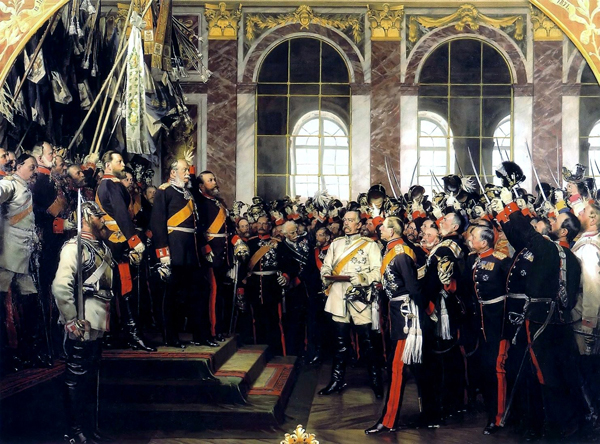A fictional account of the Parisian reaction to the acceptance of German terms for peace from Emile Zola's novel La débâcle [ The Downfall ] (1892)
In this passage Zola describes the process of accepting German peace terms and the establishment of a new government to officially accept them -- all from the perspective of his character Maurice. Thiers was the leader of the provisional Government of National Defense that accepted the Prussian terms. He called for elections, and so that there would be a new government to officially accept the treaty. With great support in the French provinces his conservative supporters won a majority, and many people, like Zola's Maurice, assumed that it would just a matter of time before France was once again ruled by a king. By accepting the terms of the treaty France agreed to make giant payments to the newly founded German Empire led by the Prussians and to give up its eastern provinces Alsace and Lorraine. This enraged nationalistic Parisians who opposed the movement to the political right and wanted to continue fighting the Germans. Their anger was only increased, when the newly elected government of France allowed the Prussians, as stipulated in the treaty, to humiliate the French by marching down the Champs Elysee in a gesture designed to demonstrate the Germans power over the French. |
On the 28th of January the news burst on Paris like a thunderclap that for the past two days negotiations had been going on, between Jules Favre and M. von
Anton von Werner, The Proclamation of the German Empire (1885) The decision to proclaim the creation of a new German empire at Versailles -- the symbol of French power under Louis XIV -- was a further insult to the French |
Bismarck, looking to an armistice, and at the same time it learned that there was bread for only ten dayslonger, a space of time that would hardly suffice to revictual the city. Capitulation was become a matter of material necessity. Paris, stupefied by the hard truths that were imparted to it at that late day, remained sullenly silent and made no sign. Midnight of that day heard the last shot from the German guns, and on the 29th, when the Prussians had taken possession of the forts, Maurice went with his regiment into the camp that was assigned them over by Montrouge, within the fortifications. . . .
He read with avidity all the revolutionary newspapers he could lay hands on; that three weeks' armistice, concluded solely for the purpose of allowing France to elect an assembly that should ratify the conditions of peace, appeared to him a delusion and a snare, another and a final instance of treason. Even if Paris were forced to capitulate, he was with Gambetta for the prosecution of the war in the north and on the line of the Loire. He overflowed with indignation at the disaster of Bourbaki's army in the east, which had been compelled to throw itself into Switzerland, and the result of the elections made him furious: it would be just as he had always predicted; the base, cowardly provinces, irritated by Paris' protracted resistance, would insist on peace at any price and restore the monarchy while the Prussian guns were still directed on the city. After the first sessions, at Bordeaux, Thiers, elected in twenty-six departments and constituted by unanimous acclaim the chief executive, appeared to his eyes a monster of iniquity, the father of lies, a man capable of every crime. The terms of the peace concluded by that assemblage of monarchists seemed to him to put the finishing touch to their infamy, his blood boiled merely at the thought of those hard conditions: an indemnity of five milliards, Metz to be given up, Alsace to be ceded, France's blood and treasure pouring from the gaping wound, thenceforth incurable, that was thus opened in her flank. . . .
The 1st of March was the day fixed for the entrance of the Prussians into Paris, and a long-drawn howl of wrath and execration went up from every heart. Maurice never attended a meeting now that he did not hear Thiers, the Assembly, even the men of September 4th themselves, cursed and reviled because they had not spared the great heroic city that crowning degradation. He was himself one night aroused to such a pitch of frenzy that he took the floor and shouted that it was the duty of all Paris to go and die on the ramparts rather than suffer the entrance of a single Prussian. . . . When on March 1 the Prussians took possession of the quarter of the Champs Elysees, which they were to occupy only for one day, keeping themselves strictly within the limits of the barriers, Paris looked on in sullen silence, its streets deserted, its houses closed, the entire city lifeless and shrouded in its dense veil of mourning.
